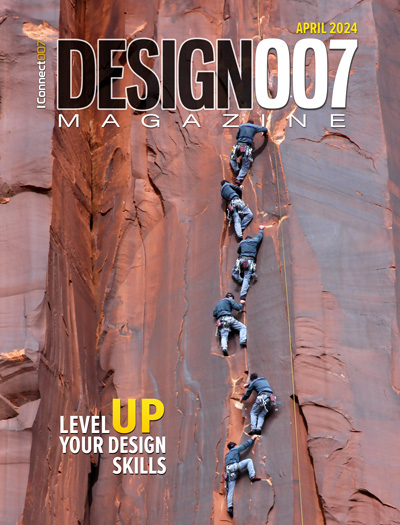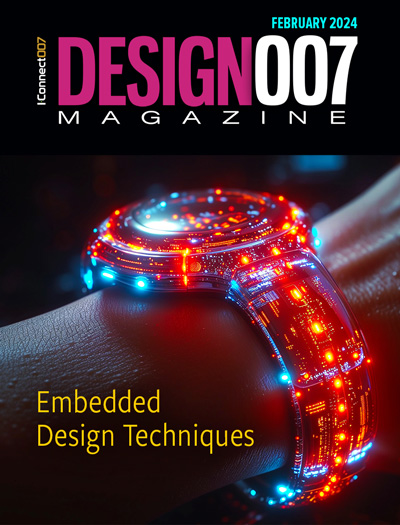-

- News
- Books
Featured Books
- design007 Magazine
Latest Issues
Current Issue
Level Up Your Design Skills
This month, our contributors discuss the PCB design classes available at IPC APEX EXPO 2024. As they explain, these courses cover everything from the basics of design through avoiding over-constraining high-speed boards, and so much more!

Opportunities and Challenges
In this issue, our expert contributors discuss the many opportunities and challenges in the PCB design community, and what can be done to grow the numbers of PCB designers—and design instructors.

Embedded Design Techniques
Our expert contributors provide the knowledge this month that designers need to be aware of to make intelligent, educated decisions about embedded design. Many design and manufacturing hurdles can trip up designers who are new to this technology.
- Articles
- Columns
Search Console
- Links
- Events
||| MENU - design007 Magazine
True Experts Can Cite Their Sources
March 23, 2023 | I-Connect007 Editorial TeamEstimated reading time: 2 minutes
We’ve heard a lot lately about the need to identify tribal knowledge within our organizations. How do you know whether an “expert” is sharing documented knowledge or it’s just something they learned at their first job during the Carter administration?
We asked IPC design instructor Kris Moyer to explain his process for separating the wheat from the chaff, so to speak, in design knowledge. As he points out, a true expert will not be afraid to cite the sources and data sets behind their arguments. Ask questions; maybe there is a reason why they “always did it this way.”
Barry Matties: Kris, what are the signs when you think someone is presenting tribal knowledge?
When someone says to me, “This is the way I was told to do it,” I say “Why?” If their only answer is, “That's the way we've always done it,” I say, “Do some research and understand what the history was.”
It is always important to have a history of the rationale behind decisions that were made on the design so that we don't lose that knowledge. We may have done things a certain way at one point in history, but we must back everything up with rationale and quantified engineering data. That's the biggest problem with tribal knowledge: “This is how we've always done it. The company way is fine.” If you can answer why and have a technical rationale of why it's still valid, I'm all for it. Otherwise, I will push until you sit there and give me a technical rationale for why it's still necessary. Can you prove you’re right?
But when you're sitting in the classroom listening to a PCB design instructor, how do you validate whether that's just tribal knowledge? Do you accept that as the truth?
First, is the instructor a well-respected PCB design instructor? They should be current on their data and able to cite and show their data sources. The best teachers in the world love to be challenged. When a student says to me, “I came up with X, Y, and Z for that,” I'm always willing to look at their data, and see if it fits. If necessary, I’ll update my information.
Colleges and organizations love to be challenged on their data. You name it: IPC, IEEE, Johns Hopkins University Applied Physics Lab. Any organization that does engineering, data engineering, or research engineering white papers is usually more than happy to answer your questions.
To read this entire conversation, which appeared in the March 2023 issue of Design007 Magazine, click here.
Suggested Items
Real Time with... IPC APEX EXPO 2024: Exploring IPC's PCB Design Courses with Kris Moyer
04/18/2024 | Real Time with...IPC APEX EXPOGuest Editor Kelly Dack and IPC instructor Kris Moyer discuss IPC's PCB design training and education offerings. They delve into course topics such as design fundamentals, mil/aero, rigid-flex, RF design, and advanced design concepts. They also highlight material selection for high-speed design, thermal management, and dissipation techniques. The interview wraps up with details about how to access these courses online.
Cadence Unveils Palladium Z3 and Protium X3 Systems
04/18/2024 | Cadence Design SystemsThe Palladium Z3 and Protium X3 systems offer increased capacity, and scale from job sizes of 16 million gates up to 48 billion gates, so the largest SoCs can be tested as a whole rather than just partial models, ensuring proper functionality and performance.
Signal Integrity Expert Donald Telian to Teach 'Signal Integrity, In Practice' Masterclass Globally
04/17/2024 | PRLOGDonald Telian and The EEcosystem announce the global tour of "Signal Integrity, In Practice," a groundbreaking LIVE masterclass designed to equip hardware engineers with essential skills for solving Signal Integrity (SI) challenges in today's fast-paced technological landscape.
On the Line With... Podcast Talks With Cadence Expert on Manufacturing
04/18/2024 | I-Connect007In “PCB 3.0: A New Design Methodology: Manufacturing” Patrick Davis returns to the podcast to talk about design rules. As design considerations become more and more complex, so, too, do the rulesets designers must abide by.
Designing Electronics for High Thermal Loads
04/16/2024 | Akber Roy, Rush PCB Inc.Developing proactive thermal management strategies is important in the early stages of the PCB design cycle to minimize costly redesign iterations. Here, I delve into key aspects of electronic design that hold particular relevance for managing heat in electronic systems. Each of these considerations plays a pivotal role in enhancing the reliability and performance of the overall system.


